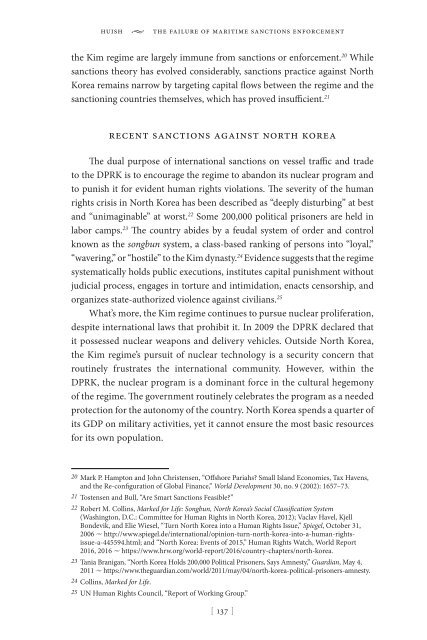2jBVKVf
2jBVKVf
2jBVKVf
Create successful ePaper yourself
Turn your PDF publications into a flip-book with our unique Google optimized e-Paper software.
huish • the failure of maritime sanctions enforcement<br />
the Kim regime are largely immune from sanctions or enforcement. 20 While<br />
sanctions theory has evolved considerably, sanctions practice against North<br />
Korea remains narrow by targeting capital flows between the regime and the<br />
sanctioning countries themselves, which has proved insufficient. 21<br />
recent sanctions against north korea<br />
The dual purpose of international sanctions on vessel traffic and trade<br />
to the DPRK is to encourage the regime to abandon its nuclear program and<br />
to punish it for evident human rights violations. The severity of the human<br />
rights crisis in North Korea has been described as “deeply disturbing” at best<br />
and “unimaginable” at worst. 22 Some 200,000 political prisoners are held in<br />
labor camps. 23 The country abides by a feudal system of order and control<br />
known as the songbun system, a class-based ranking of persons into “loyal,”<br />
“wavering,” or “hostile” to the Kim dynasty. 24 Evidence suggests that the regime<br />
systematically holds public executions, institutes capital punishment without<br />
judicial process, engages in torture and intimidation, enacts censorship, and<br />
organizes state-authorized violence against civilians. 25<br />
What’s more, the Kim regime continues to pursue nuclear proliferation,<br />
despite international laws that prohibit it. In 2009 the DPRK declared that<br />
it possessed nuclear weapons and delivery vehicles. Outside North Korea,<br />
the Kim regime’s pursuit of nuclear technology is a security concern that<br />
routinely frustrates the international community. However, within the<br />
DPRK, the nuclear program is a dominant force in the cultural hegemony<br />
of the regime. The government routinely celebrates the program as a needed<br />
protection for the autonomy of the country. North Korea spends a quarter of<br />
its GDP on military activities, yet it cannot ensure the most basic resources<br />
for its own population.<br />
20 Mark P. Hampton and John Christensen, “Offshore Pariahs? Small Island Economies, Tax Havens,<br />
and the Re-configuration of Global Finance,” World Development 30, no. 9 (2002): 1657–73.<br />
21 Tostensen and Bull, “Are Smart Sanctions Feasible?”<br />
22 Robert M. Collins, Marked for Life: Songbun, North Korea’s Social Classification System<br />
(Washington, D.C.: Committee for Human Rights in North Korea, 2012); Vaclav Havel, Kjell<br />
Bondevik, and Elie Wiesel, “Turn North Korea into a Human Rights Issue,” Spiegel, October 31,<br />
2006 u http://www.spiegel.de/international/opinion-turn-north-korea-into-a-human-rightsissue-a-445594.html;<br />
and “North Korea: Events of 2015,” Human Rights Watch, World Report<br />
2016, 2016 u https://www.hrw.org/world-report/2016/country-chapters/north-korea.<br />
23 Tania Branigan, “North Korea Holds 200,000 Political Prisoners, Says Amnesty,” Guardian, May 4,<br />
2011 u https://www.theguardian.com/world/2011/may/04/north-korea-political-prisoners-amnesty.<br />
24 Collins, Marked for Life.<br />
25 UN Human Rights Council, “Report of Working Group.”<br />
[ 137 ]


